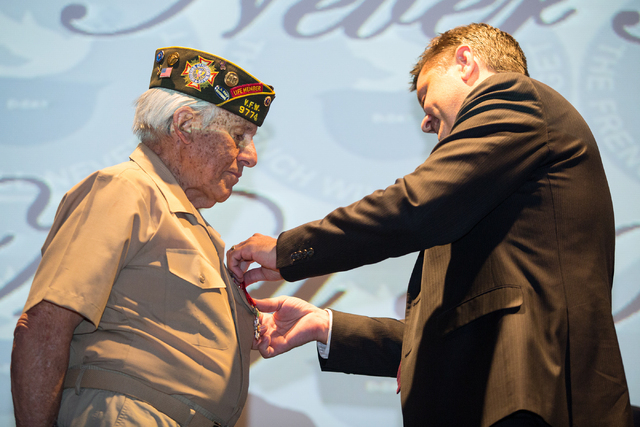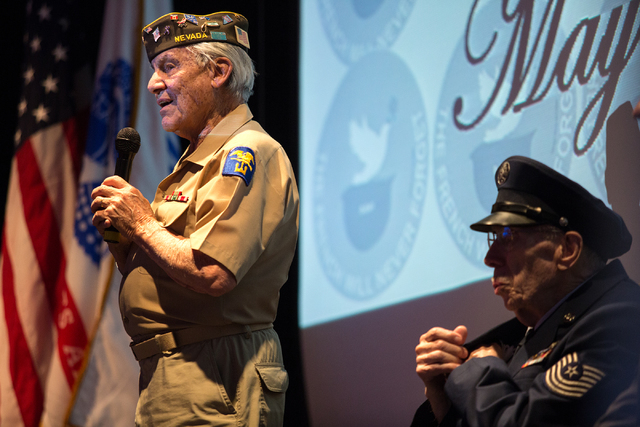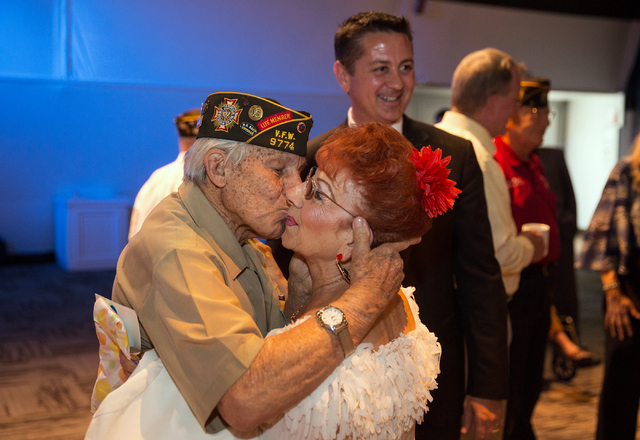Las Vegas barber returns to Normandy and D-Day memories
Seventy years after the D-Day invasion of Normandy to liberate France from the grip of Germany’s Nazi regime, a barber from Las Vegas who was part of the Allied Expeditionary Force returned there today to reflect on his life-changing experience.
It will be deja vu for Gaetano “Guy” R. Benza, who landed on the second day of the assault on Omaha Beach, shuttling supplies to infantry soldiers.
When he was there five years ago for D-Day’s 65th anniversary he brought back a cup of sand to show students when he speaks about his World War II experience at Clark County schools.
“I hold that cup and I show people,” he said before he left Sunday for this anniversary trip. “This is not only sand. This is sand from Normandy. And ladies and gentlemen, there’s blood in this sand. You don’t see it but I know it’s there.”
Like in 2009, he said he will bring back more sand from Normandy to replenish his dwindling supply.
Benza, 89, still cuts hair part time at Jesse’s Barber Shop on East Tropicana Avenue. But on June 7, 1944, he was an Army private on an amphibious craft that hauled supplies and ammunition to Omaha Beach. He spent four months in Normandy and offshore where he sometimes encountered heavy fire.
An Army draftee from New York City, Benza was a crew member for one of the many amphibious DUKWs, or “duck” boats, a small landing craft with all-wheel drive for sandy beaches.
In a June 12, 1944, dispatch from the Normandy beachhead, Pulitzer Prize-winning correspondent Ernie Pyle — who was killed a year later by a Japanese machine gunner in the South Pacific — described the task of units like Benza’s 279th Port Company, 505th Port Battalion.
The effort, Pyle wrote, was “grim determination of work-weary men to get this chaotic beach organized and get all the vital supplies and reinforcements moving more rapidly over it from the stacked up ships standing in droves out to sea.”
Four days later Pyle described the aftermath of the “many-miled invasion beach.”
“The wreckage was vast and startling. The awful waste and destruction of war, even aside from the loss of human life has always been one of its outstanding features to those who are in it,” Pyle wrote.
It was almost daylight on June 7, 1944, when Benza first saw Omaha Beach.
“I saw many (bodies) lying on the beach. It took days to remove them. Many dead, fatally wounded. A lot of blood,” he said.
Benza remembers the scene as “a big beach with … bunkers. There were 88s on those bunkers that were still firing,” he said, describing Germany’s big 88mm anti-aircraft and anti-tank artillery guns.
“They would shoot through the air and (flak) would spatter. That’s why you wore that steel helmet. I could hear many times when it would hit my helmet and go, ‘boom, bang,’ ” he said.
The June 6, 1944, invasion became known as D-Day for the military term denoting the “day” of the attack. It had been planned by free-world military leaders under Supreme Allied Commander Gen. Dwight D. Eisenhower. The attack’s code-name was Operation Overlord but the landings were orchestrated under Operation Neptune.
It would go down as the largest amphibious invasion in history and a turning point in World War II that led to the defeat of German dictator Adolf Hitler’s Nazi forces.
In all, about 2.7 million Allied troops gathered in southern England for the assault. The 150,000 who participated in the Normandy landings crossed the English channel on board some 5,000 vessels that also carried 30,000 vehicles to the beaches.
In the air, more than 300 aircraft dropped 13,000 bombs to clear the French coast for the invasion. Hundreds more fighter planes were involved in escorts and attacks. Spearheading the assault were more than 800 transport planes, some towing gliders, that delivered six parachute regiments totaling some 13,000 paratroopers.
By the end of what’s known as “the longest day,” about 10,000 Allied troops had been killed or seriously wounded.
One of Benza’s most frightening moments happened one night while he was on board an ammunition ship.
“The whole sky lit up all of a sudden. That was a flare from a German fighter plane,” he said. “He cut his engine. Then before you know it, you could hear him come around.
“He proceeded to drop bombs,” Benza recalled. “I can honestly tell you the fellows and myself (ages) 19 to 25, all we did was get down on our knees and pray to God, and we were saying goodbye to our mothers and fathers because there was no way we were ever going to get out of this.”
The ammo ship was guarded by a couple of tank landing ships and the gunfire exchange was deafening.
“Today after all those years it’s a wonder I still hear because at that moment you could see everybody yelling at each other. We were so scared, and you could see their mouths moving but you can’t hear them,” he said.
After a few months of running supplies and ammo at Omaha Beach, Benza’s unit relocated to Le Havre, France, where he continued to support Army combat operations until the end of the war. After Germany surrendered, he helped put holocaust survivors from Nazi concentration camps onto refugee transport ships.
“I felt so bad for those people,” he said. “When you see the person and you see the numbers on their arm, that’s when you believe it. And they were so skinny, you could just (blow) and they would fall over.”
Like he did on the 65th anniversary, Benza said he intends to visit the Normandy American Cemetery and Memorial near Omaha Beach.
“Anybody who goes to that cemetery and doesn’t shed a tear, you got no heart,” he said. “I do. Because I remember. It’s hard. It’s very, very hard.”
Contact Keith Rogers at krogers@reviewjournal.com or 702-383-0308. Find him on Twitter: @KeithRogers2.
Related story
French recognize two Southern Nevadans for D-Day invasion gallantry





















